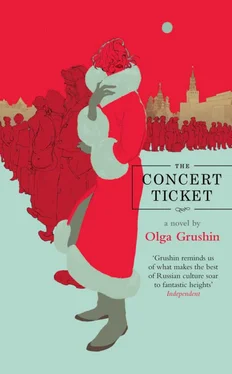He wanted to shout at the odious man before him, to bang his fists against the desk, to grab his dossier and rip it in half. Instead, his words sputtered and fizzled out; he felt his limbs fill with lead, and his throat with dead, dusty insects. He stood without moving, without speaking, staring with pure, fierce hatred at the marble swan expiring on the obese man’s desk.
“I confess I expected a little more enthusiasm,” said Ivan Anatolievich frostily. “You start your new schedule on Thursday. And remember, I’ll be watching you.”
Sergei backed out of the office.
The kiosk’s hours were ten to five.
Unless the tickets went on sale in the next three days, it was unlikely he would go to the concert.
That night he barely slept, and at dawn the next morning he was the first to arrive in the quiet street; but the kiosk remained closed, as before. Neither did it open on Tuesday, though by then, at least, he had the satisfaction of being publicly confirmed in his belief: the line was swelling with an excited buzz of the Selinsky symphony. On Wednesday, the temperature dropped. People stomped their boots, puffed on their gloves; many left early, mumbling that no concert was worth freezing to death for. Sergei waited stubbornly, though he had lost all feeling in the toes of his left foot and though his breath, escaping in steaming bursts, had caused a whole beard of miniature icicles to grow on his scarf; but in mid-afternoon he too was forced to give up his place at the head of the line—as it was, he risked being late for work.
He was already at the next intersection when a small beat-up van labored past him. His heart quickening, he turned, followed it with his eyes. The van pulled up to the curb by the kiosk.
He swallowed an incoherent, thwarted gasp, and, just as the dented door of the van began to jerk open, dashed back, and instantly tripped over his shoelaces and started to fall, but somehow righted himself and, vaulting forward, slipped on the ice and fell again, and this time kept falling, skidding, sliding in a flurry of snow, closing his eyes against the dazzling, wet confusion, fully sprawled on his back now, coming at last to a blind, whirling stop.
For a moment he did not move. Then, deciding that nothing was broken, he opened his eyes, and was just attempting to scramble up when he saw the sky.
The sky was pale and empty and vast, and it appeared to float ever higher in transparent layers gradually bleached of all blue tints and shadows, until, at some vertiginous, unimaginable height, it seemed to him bled of all color, of all confusion, intense and pure like the essence of one sustained, crystal note.
He lay still and looked at it.
The van door slammed shut, and two pairs of legs crossed his upended horizon at odd angles. The first pair, ending with black shoes, possibly imported, stepped over him; the second, clumsy in felt boots, circled around, encumbered by a ladder. Sergei looked at the sky. From somewhere above drifted a scraping of wood against metal, a peremptory voice issuing commands, “Move to the left!” “Make sure it’s not crooked!” and, after a minute, the blows of a hammer. Winter muffled each harsh burst in cold, snowy pockets before the sounds could quite take their jagged, crowlike flight skyward; the sky did not reverberate, for it was immensely distant—and filled to the brim with its own clear, silent, infinite music. When the banging stopped, the two pairs of legs swerved back around him, the door moaned in opening and barked in closing, the motor sneezed and coughed and spat going past. Then all was quiet.
A couple of people from the line helped him up. There was now a large sign nailed above the kiosk. It announced, in bleached blue letters: CONCERT TICKETS.
“Too faded to have been freshly painted,” a man in a fedora noted with disapproval. “They must have taken it from some old kiosk no longer in operation.”
Sergei gazed at it blankly, then, recalling the time, hurried to the theater. He arrived nearly half an hour late, his coat caked with sleet and missing two buttons. Ivan Anatolievich, whom he encountered in a corridor on the way in, gave him a dirty look.
“Ten o’clock sharp tomorrow!” he boomed as Sergei was squeezing past. “And oh, I’ll be in on Friday if you feel the urge to drop by.”
The brittle January days, all sunshine and chunks of ice, soon darkened and shrank, passing into February in a sinking, gray procession. Every evening, the instant he was allowed to leave, Sergei flung his coat over his back and, too rushed to thread his arms through the sleeves, ran across the city, his coat leaping after him. The kiosk was always boarded up by the time he arrived, the purple streetlamp illuminating the deserted street. Wheezing, he would hobble up to the window, circle the kiosk once or twice, try to peer inside in an attempt to discern whether any tickets had been sold that day. He would gauge the length of the day’s line by looking at the sidewalk: at some distance, the pavement would be hard and white with ice, then, as he got closer, would turn black and naked, its snow having melted in the shuffling of dozens of feet. The ground bristled with a stubble of cigarette butts; over the next week or two, he watched them steadily encroach upon the surrounding snowdrifts.
By the time the butts were dotting the sidewalk all the way down the block and around the corner, he had given up hope of ever buying the ticket, and was taking a direct route home. One evening, as he was trudging along, giving cautious berth to dog feces, feeling an unaccustomed ache in his back, he glimpsed a portly woman moving with slow, laden steps in the snow-whirled darkness ahead, a bulging bag in each hand.
Briefly he hesitated, then caught up. “Here,” he said, “let me.”
“Oh.” A small laugh escaped her. “Thank you, Serezha. Lots of homework today.”
For some time they walked in silence. Damp snow slapped at his eyes, flew into his mouth. “It must be tedious for you,” he said at last. “Waiting in that line day after day.”
“It’s not too bad. I come in the afternoons, as soon as my classes are done. I’m worried, of course, that they’ll deliver the tickets in the morning, but starting in March, two of my mornings will open up. Of course, it will be before then for sure—who’s ever heard of a line lasting two months, you know—but just in case. Emilia Khristianovna is in line also, we’ve been talking about working something out between us, covering for each other—”
“Sure, that sounds reasonable,” he said, not listening. “Look, Anya, I’ve been meaning to talk to you about something for a while, but I haven’t had a chance at home—”
She smiled uncertainly. “We eat supper together every night.”
“Yes, well,” he mumbled. “It just keeps slipping my mind, I guess. Anyway, you know I was hoping to get a ticket myself, to go to the concert, that is, but with my new schedule, I can never get to the kiosk on time, and, well”—she was descending a short flight of steps now; he followed—“I was thinking, since you’re in line anyway, you might be able to, you know—”
She reached the door at the bottom of the stairs, turned toward him. Shadows gathered here, the streetlamp above leaking in blotchy dribbles; he could see only her hands, pressed against her rough gray coat as if in prayer, and, in the twilight of her face, her eyebrows, glistening with tiny droplets of melting snow, lifting like the wings of a nervous bird.
“But Serezha,” she said quietly, “they’ll sell only one ticket per person, you know that. I promised mine to Mama.”
“Of course,” he said, “but it’s obvious that she—”
“I’m sorry, I must buy some bread… See you at home?”
“I’ll come with you,” he offered quickly. “Anyway, it’s obvious that she doesn’t—”
Читать дальше












